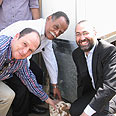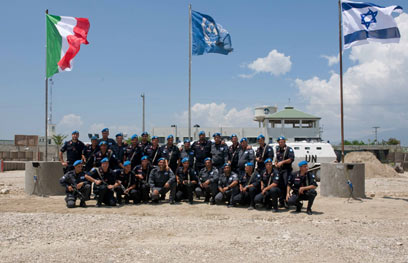
November 2010, Haiti. A large crowd gathers at a United Nations base 250 km (155 miles) north of Port-au-Prince, following reports that the Nepalese soldiers stationed there have brought with them the Cholera epidemic to the earthquake-stricken island. The 170 soldiers, serving with UN peacekeeping forces, call for help, and a special force of 21 Italian and Israeli troops responds on the scene with Armored Personnel Carriers.
"They were about to be lynched. The sights reminded me of the intifada at its worst," says Chief Superintendent Meir Namir, who headed the police delegation that stayed in Haiti for three and a half months, and received considerable praise for its achievements.
"The violence was brutal; stones, arson and shootings," he recalls. "We used crowd dispersal means and even tear gas. Even though we were only 14 Israelis, we were worth many times more. After we left, the foreign soldiers asked the force commander if he can bring more Israelis."
The police delegation that was sent to Haiti is just one example of the Foreign Ministry's efforts in recent years, which aim to increase Israel's involvement global affairs. For a state that views the UN as a hostile body, Israel's involvement in international crises is not to be taken for granted. "Forget the UN; it doesn’t matter what the gentiles say, it matters what the Jews do," Israel's first prime minister, David Ben-Gurion, famouly said. This attitude has not changed much for decades.

Israeli flag in Haiti, post-quake
So why should a nation that often has a prime spot on the UN agenda, largely under negative circumstances, associate itself with such an organization? It appears that the slogan that stands at the heart of Foreign Ministry efforts to move from separatism to involvement is "If you can't beat them, join them."
"We have reached the conclusion that the UN is not a body that makes only anti-Israeli decisions, but also does many other things," said Eviatar Manor, who heads the Ministry's International Organizations division. "There are issues such as epidemics, desertification and climate change, which the government cannot solve alone and there's a need for a global effort.
"We see the UN as an instrument to promote Israeli expertise and financial activity. It's not a crime to use the positive things that we do to enhance our 'soft power,' and show that we are not just a burden on the UN. We provide positive aspects as well."
Political 'Snakes and Ladders'
Israel's international standing is directly affected by its political actions. At times of calm, regional integration and scientific and financial achievements, Israel naturally manages to reach higher degrees of international cooperation. In times of escalating conflict and stalled negotiations, Israel grows isolated.
Within the Foreign Ministry, the phenomenon is dubbed "Snakes and Ladders." Currently, while Israel is in one of its worst political slumps, state officials are trying every measure to leverage its international initiatives to improve its global status.
"We are paying $44 million in member fees to the UN and the peacekeeping forces – 0.382% of the UN budget," says Merav Eilon-Shahar, the director of the Foreign Ministry's UN Political Affairs Department. "We are ranked 32nd out of 192 nations, and that's a lot."
According to Eilon-Shahar, Israel's investment does yield returns. Starting in 2012, Israel will be on the United Nations Development Program's executive board for the first time, and in 2013, it will join the executive board of the United Nations Children's Fund (UNICEF).
Another UN division that the Foreign Ministry has got its eye on is UN Women, an organization dedicated to gender equality and the empowerment of women. It has already been decided to pay 10 times the fees Israel currently pays for membership in the organization, in hopes of being elected for its executive board as early as 2014.
Other divisions on the Foreign Ministry's target list are UNESCO, and even the UN Security Council. Eilon-Shahar notes that six years ago Israel applied for coucil membership for 2019-2020. The elections are to be held in 2018
"The Security Council is the world's government," she says. "It is the most exclusive body."
Empowering developing nations
"Politics are like a swamp; if you're in but can't find a rope, you drown," explains Tibor Shalev Schlosser, a director at the Division for International Organizations. "Our rope is integration in the global agenda, and we are using all the leverage we have.
"In the World Health Organization, for example, we have a great reputation. A few years ago we joined the UN's international group of disaster experts who are spread around the world, ready to be called for duty. Currently, we have five such experts who are available 24 hours a day."
One of the Foreign Ministry's most significant "Ladders" is Mashav, the Center for International Cooperation. The center is one of the world's oldest bodies that provide aid to developing countries, and is considered one of the state's biggest sources of pride. Recently the Israeli team in Haiti laid the cornerstone for a new emergency room that will have both Israeli financing and technology – as per the local government's request. In fact, the Israeli delegation is one of the last to remain on the island following the earthquake that claimed the lives of over 200,000 people.
"We didn't start these activities yesterday, but in the 1950s, when Israel was still a nation that needed aid," said Mashav Deputy Director General Haim Dibon. "This is the legacy of Ben-Gurion, who said that what one has should be shared with others."

Golda Meir at women's center, '60s. (Photo: Itzik Yona)
These days, Mashav is active in almost every developing nation in the world, primarily in the fields of agriculture, irrigation, medicine and education. Mashav is also taking steps to empower women; in 1961, Golda Meir, then foreign minister, founded the Mount Carmel International Training Center, which trains women from developing nations and transitional societies to this day.
"It's important for Israel to be seen not only as the source of conflict, but as a contributor to the world," Dibon says.
The Foreign Ministry is aware that Israel's rebranding process is still in its infancy, and will take a long time to take effect. "We want to show a multifaceted state," Shalev Schlosser and Eilon-Shahar conclude.
"Beyond the conflict, which is important and should be dealt with, there are many other facets. The police officers that we sent to Haiti are an example of collective responsibility. To integrate as much as possible is in our political interest, because if we remain in the 'conflict box,' we sin against ourselves.
”We must do the most to be a nation like other nations. We no longer are the scorned kid in the corner, but sit firmly on the class seat."
- Follow Ynetnews on Facebook















